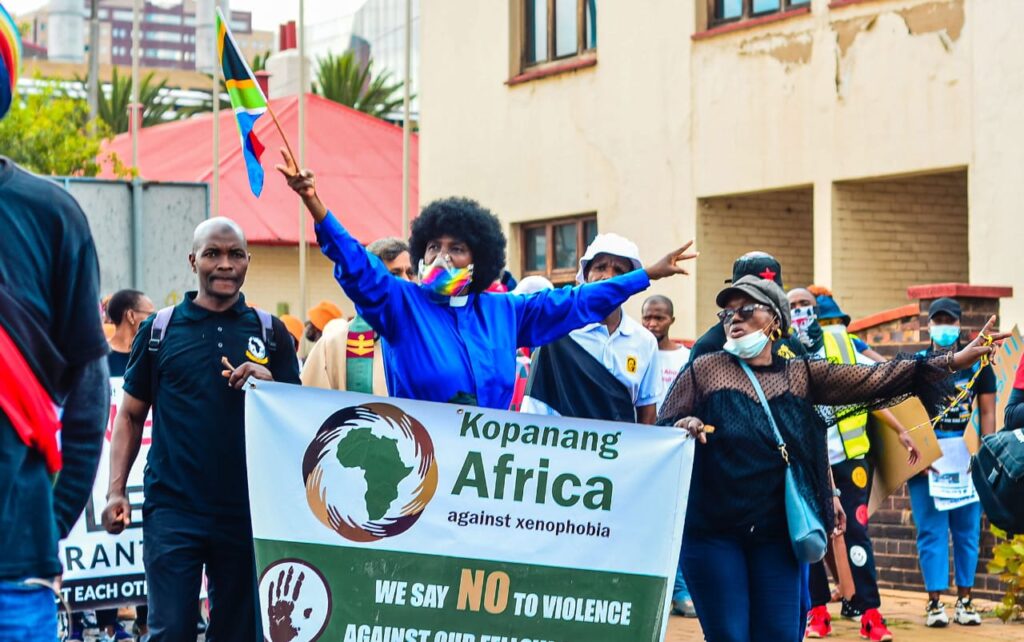

Kopanang Africa Against Xenophobia (KAAX) welcomes landmark judgment from the Gauteng Division of the High Court in Johannesburg on the 4th of November 2025 as a resounding victory for human dignity, the rule of law, and our Constitutional democracy. Our reaction is one of profound relief and affirmation.
This decisive ruling, which interdicts Operation Dudula from preventing foreign nationals from accessing public health facilities and schools, is a powerful confirmation that human dignity has no nationality.
It rightly condemns the vigilante actions that have terrorized vulnerable communities and violated their fundamental rights to life, equality, and security.
We thank our lead representatives SERI and all amici curiae for their vital contributions.
This victory is a collective achievement of all parties involved
The Significance of the Judgment
This ruling provides protection for those targeted by xenophobic attacks. Specifically, it means:
-An End to Private Policing:
The court has made it unequivocally clear that only an immigration officer or a police officer has the legal power to demand identification documents.
Operation Dudula is now formally restrained from demanding that any private person produce their documents.
-Protected Access to Essential Services: The interdict explicitly prohibits Operation Dudula from interfering with access to healthcare services and schools, and from unlawfully evicting people from their homes or removing informal traders from their stalls.
This is a good step in halting the tragic consequences of their actions, which have included forcing pregnant women to give birth at home and even leading to the death of a one-year-old child who was denied medical care .
-A Barrier Against Hate Speech:
The court has interdicted Operation Dudula from making public statements that constitute hate speech based on nationality, social origin, or ethnicity.
A Profound Reinterpretation of Immigration Law
Beyond the interdict, the court provided a binding, constitutional interpretation of Section 41 of the Immigration Act, which is frequently misused.
The court declared that the powers to request identification:
-Are confined to public places and do not authorize warrantless searches in private homes, workplaces, or places of study .
-Require that an officer hold a reasonable suspicion that a person is unlawfully in South Africa.
-Do not permit the interrogation, arrest, and detention of children under the age of 18, except as a measure of last resort .
A Call for State Action and Accountability
This judgment is not only a condemnation of Operation Dudula but also a directive to the South African government.
The court has ordered the government to take reasonable steps to implement the National Action Plan to Combat Racism, Racial Discrimination, Xenophobia and Related Intolerance .
This includes establishing an early warning and rapid response mechanism to threats of xenophobic hate speech and hate crimes.
While the court did not find evidence of collusion between state organs and Operation Dudula, it has made it clear that the police and Home Affairs departments must not be complacent and must adhere to constitutional procedures.
Conclusion
While some Operation Dudula members have indicated they will not alter their position, this judgment empowers the state to act decisively against any further unlawful conduct.
We urge the South African Police Service to uphold this court order and ensure the safety and constitutional rights of all people in South Africa.
This victory is a necessary step to protect our shared humanity and reaffirms that the rights in our Bill of Rights apply to everyone within our borders, regardless of nationality.
We will continue to work tirelessly to ensure this judgment is implemented and respected.
Tshwane Talks readers have been able to read stories in this publication for free for over two years now. We still want our readers to access our stories for free, but we are asking those among our readers who can afford it to contribute at least R30 a month to cover some of the costs of publishing this independent, non-aligned online newspaper which gives a voice to all sectors of society irrespective of race, colour, creed, religion, or political affiliation. You may make your contribution by depositing at least R30 a month into Tshwane Talks' bank account. Details are as follows:
Bank Details
Bank: Standard Bank
Account Number: 10225548834
Account Type: Cheque Account